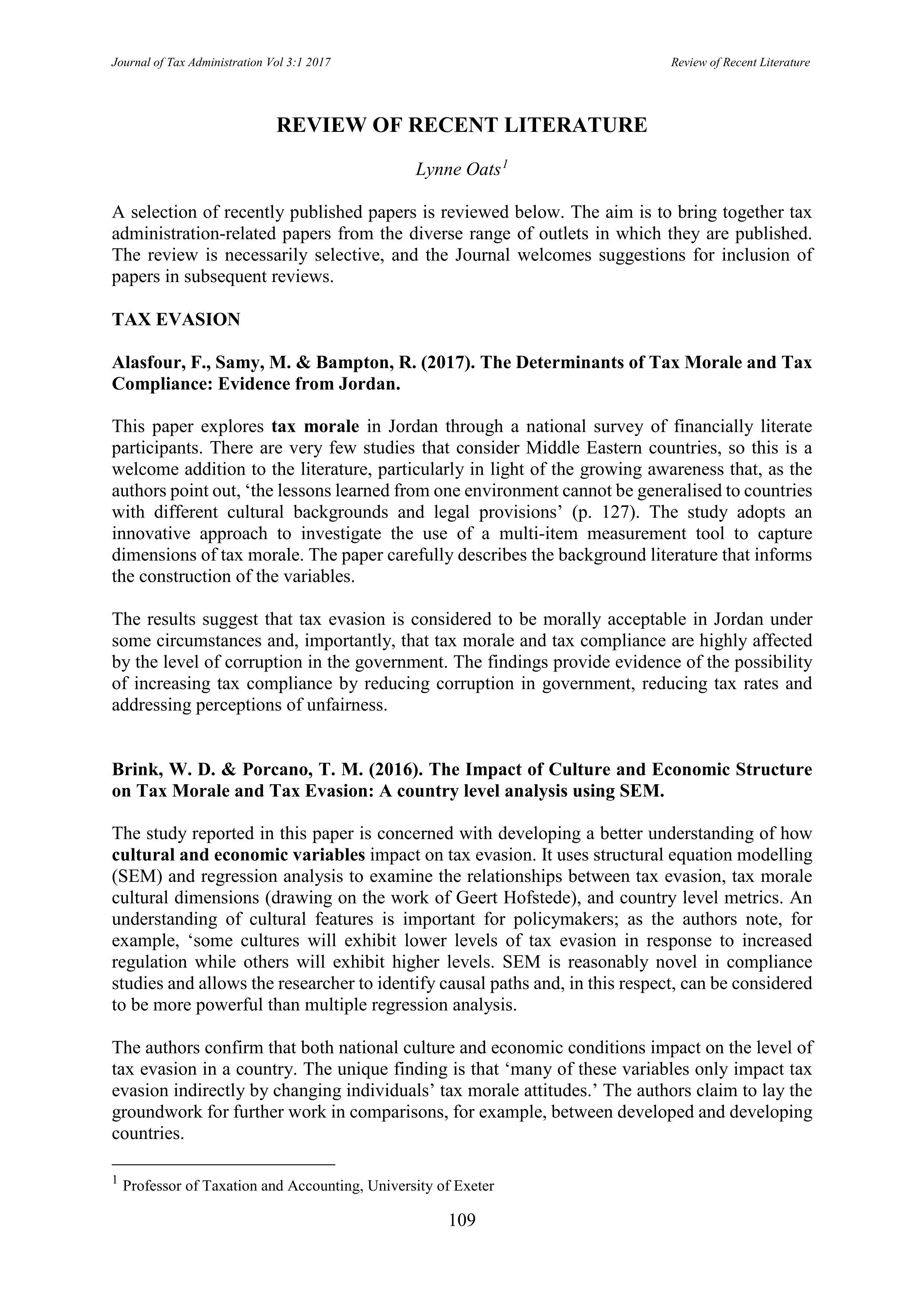Review of Recent Literature
Keywords:
Tax Evasion, Tax Compliance, Tax Administrations, Tax Agency Efficiency, Taxpayer Rights, Dispute Resolution, Tax Complexity, Tax TransparencyReferences
Abreu, A. G., & Greenstein, R. K. (2016). Tax as Everylaw: Interpretation, Enforcement and the Legitimacy of the IRS. Tax Lawyer, 69(3), 493-512.
Alasfour, F., Samy, M., & Bampton, R. (2017). The Determinants of Tax Morale and Tax Compliance: Evidence from Jordan. In John Hasseldine (Ed.), Advances in Taxation, (Advances in Taxation, Volume 23), (pp.125-171). Emerald Group Publishing Limited.
Bartmann, A. (2016). Making Taxpayer Rights Real: Overcoming Challenges to Integrate Taxpayer Rights into a Tax Agency’s Operations System. Tax Lawyer, 69(3), 597-624.
Bentley, D. (2016). Taxpayer Rights in Australia twenty years after the introduction of the Taxpayers’ Charter. eJournal of Tax Research, 14(2), 291-318.
Brink, W.D., & Porcano, T. M. (2016). The Impact of Culture and Economic Structure on Tax Morale and Tax Evasion: A country level analysis using SEM. In John Hasseldine (Ed.), Advances in Taxation, (Advances in Taxation, Volume 23), (pp.87-123). Emerald Group Publishing Limited.
Book, L. (2016). Bureaucratic Oppression and the Tax System. Tax Lawyer, 69(3), 567-596.
Burton, H., & Karlinsky, S. (2016). Tax professionals’ perception of large and mid-sized business US tax law complexity. eJournal of Tax Research, 14(1), 61-95.
Christian, C. (2016). A typology of sales tax noncompliance: Targeting enforcement to diverse intentions. eJournal of Tax Research, 14(1), 119-147.
Dharmapala, D. (2016). Cross-border tax evasion under a unilateral FATCA regime. Journal of Public Economics, 141(C), 29-37.
Drumbl, M. L. (2016). Beyond Polemics: Poverty, taxes and noncompliance. eJournal of Tax Research, 14(2), 253-290.
Dulleck, U., Fooken, J., Newton, C., Ristl, A., Schaffner, M., & Torgler, B. (2016). Tax compliance and psychic costs: Behavioral experimental evidence using a physiological marker. Journal of Public Economics, 134, 9-18.
Fogg, K. & Jozipovic, S. (2016). How can Tax Collection be Structured to Observe and Preserve Taxpayer Rights: A Discussion of Practices and Possibilities. Tax Lawyer, 69(3), 513-564.
Hickman, K. (2016). Pursuing a Single Mission (or Something Closer to it) for the IRS. Columbia Journal of Tax Law, 7(1).
Höglund, M. (2016). The importance of staff to the efficiency of the tax agency. Nordic Tax Journal, 2016(2), 113-127.
Johnson, S. (2016). The Future of American Tax Administration: Conceptual Alternatives and Political Realities. Columbia Journal of Tax Law, 7(1).
Kaye, T.A. (2016). Tax Transparency: A Tale of Two Countries. Fordham International Law Journal, 39(5), 1153.
Kuchumova, Y. (2017). The Optimal Deterrence of Tax Evasion: The Trade-off Between Information Reporting and Audits. Journal of Public Economics, 145, 162-180.
Ledermann, L. (2016). IRS Reform: Politics as Usual?. Columbia Journal of Tax Law 7(1).
Mayer, L. H. (2016). "The Better Part of Valour is Discretion": Should the IRS Change or Surrender its Oversight of Tax Exempt Organisations? Columbia Journal of Tax Law, 7(1).
Mehrotra, A. (2016). From Contested Concept to Cornerstone of Administrative Practice: Social Learning and the Early History of US Withholding. Columbia Journal of Tax Law, 7(1).
Monahan, A. (2016). A Partial Defence of the IRS as Health Care Agency. Columbia Journal of Tax Law, 7(1).
Onu, D. (2016). Measuring Tax Compliance Attitudes: What Surveys Can Tell Us about Tax Compliance Behaviour. In John Hasseldine (Ed.), Advances in Taxation, (Advances in Taxation, Volume 23), (pp.173-190). Emerald Group Publishing Limited.
Rosid, A., Evans, C. & Tran-Nam, B. (2016). Do perceptions of corruption influence personal income taxpayer reporting behaviour? Evidence from Indonesia. eJournal of Tax Research, 14(2) 387-425.
Tran-Nam, B. & Walpole, M. (2016). Tax disputes, litigation costs and access to tax justice. eJournal of Tax Research, 14(2), 319-336.

Downloads
Published
How to Cite
Issue
Section
License
Copyright (c) 2017 Lynne Oats

This work is licensed under a Creative Commons Attribution 4.0 International License.
Our open access status means that authors retain the copyright of their work. However, all papers published in JOTA are done so under a Creative Commons Attribution 4.0 International license (CC BY). This means that others can share and/or adapt your work without your permission as long as they follow certain rules, including attributing your work correctly.
You can learn more about this on our Open Access, Licensing, and Copyright Policies page.



